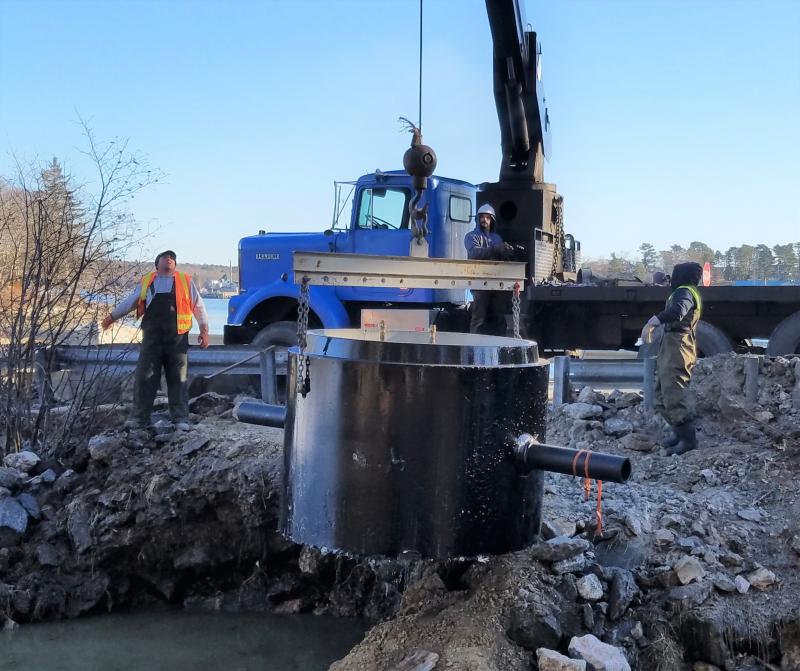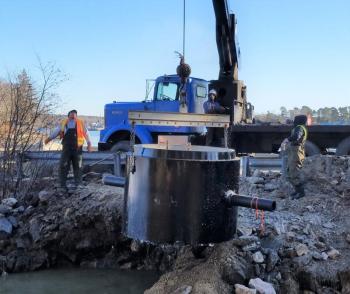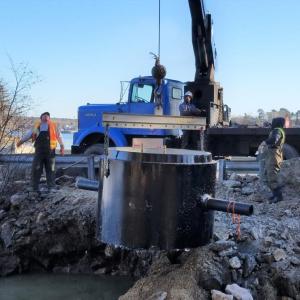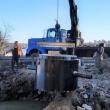West Harbor Pond siphon beginning to do its job
The old cast-iron siphon in West Harbor Pond operated for over a hundred years, maintaining the pond’s water quality. Until it broke in 2008, it continuously evacuated water from the pond bottom before it degraded sufficiently to produce an odor when discharged into the harbor. In 2018, with tremendous help from the community, the West Harbor Pond Watershed Association (WHPWA) raised the funds necessary to install a replacement siphon, which was placed in service a year ago, in March 2019. When the new siphon began operating, evacuating the degraded water that had been accumulating for 11 years, the discharge into the harbor produced a distinct odor of hydrogen sulfide (H2S), which smells like rotten eggs. The WHPWA believed that the odor would disappear once the accumulated degraded water was evacuated and the pond was restored to its prior balance.
In October 2019, the Maine Department of Environmental Protection’s (DEP) Office of Water Quality Management determined that the siphon discharge did not require a permit and that, under the state’s water quality rules, the siphon could operate year-round with no adverse impact on the water quality or aquatic life of the inner harbor. However, the DEP specified that between April 15 and Oct. 15 the flow of the siphon must be reduced by about 19% to remain within the DEP’s water quality standards.
In mid-April, as part of its year-round monthly water testing routine, the WHPWA tested the water column at the lower end of the Pond, including at the siphon intake. It found that the water column was highly oxygenated all the way to the bottom of the Pond, something that has not been seen since the WHPWA began testing in 2013. It also found a significant decrease in the salinity of the water in the lower end of the pond.
On April 21, the WHPWA collected a water sample right at the siphon intake at the 25-foot level of the pond. When the sample was brought to the surface, it gave off no odor whatsoever of H2S. While other factors may be contributing to this dramatic improvement in water quality, including the high winds of April 13, there is every indication that the siphon is successfully doing its job of evacuating the deoxygenated, H2S-laden water from the lower end of the Pond, and that it is doing so more rapidly than the WHPWA had anticipated.
On April 15, after reviewing the WHPWA’s new water quality data, DEP concluded the siphon can run at full flow all year without any water quality impacts and lifted the April-to-October flow restriction. Since the WHPWA restarted the siphon on Dec. 5 of last year, numerous people have remarked that the smell of hydrogen sulfide in the area of the siphon outfall in Boothbay Harbor, which was prominent a year ago when the new siphon first began operating, has nearly or completely disappeared.
Jason Bartlett of Maine Department of Marine Resources conducts studies of elvers and glass eels on West Harbor Pond each spring. After spending the second half of March working at his elver sampling station in the box culvert in the WHP dam, which is about 30 yards from the siphon’s outfall in the harbor, Jason stated, “I’ve been down there for two weeks now with my elver traps and haven’t smelled [the siphon] at all.”
Lee Corbin, who lives on McKown Point directly across the inner harbor from the siphon and who regularly drives across the West Harbor Pond causeway into Boothbay Harbor, declared, “When the siphon was installed a year ago and started working, the smell of “sulfur “ or “rotten eggs” was prolific. As I drove over the causeway on Route 27, it was very noticeable. This smell wafted over to my house on McKown Point across West Harbor from the siphon. This year is very different. No odor as I drive over the causeway, no odor at my home! What a difference in a year.”
The leadership of the Boothbay Harbor Yacht Club, which has been meeting almost weekly through the winter and spring at the club’s offices on the Harbor, reports that they have been pleased with the lack of odor since the siphon was reactivated. They also expressed their gratification at learning of the recent, much improved results of the water testing that was conducted just off their shoreline.
Event Date
Address
United States




























